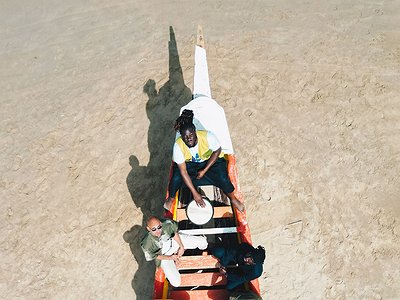Name: Balimaya Project
Members: Godwin Sonzi (acoustic guitar, electric guitar), Jonathan Moko (bass), Yahael Camara Onono (composer, arranger, djembe, percussionist, vocalist), Adeegun Crispin Robinson (congas, bata), Jeramiah Olaleye (double bass), Triston Dubison (drums, percussion), Xhosa Cole (flute, alto saxophone), Yohan Kebede (keyboards), Jamal Wilson (keyboards, grand piano), Jali Bakary Konteh (kora), Michael Olayinka (talking drum, shekere, percussion), Jaz Lee (tenor saxophone), Nathaniel Cross (trombone, arranger), Elias Jordan Atkinson (trumpet, flugelhorn)
Interviewee: Jeramiah Olaleye
Nationalities: British-West-African
Current release: The Balimaya Project's sophomore full-length studio album, When The Dust Settles, is out via New Soil.
If you enjoyed this Balimaya Project interview and would like to find out more about the band and their music, visit their official homepage. They are also on Instagram, Facebook, and twitter.
Among others, the members of Balimaya Project have collaborated with many different groups and musicians, including Ill Considered, and Ezra Collective.
[Read our Ill Considered interview]
[Read our Ezra Collective interview]
Where does the impulse to create something come from for you? What role do often-quoted sources of inspiration like dreams, other forms of art, personal relationships, politics etc play?
The impulse comes from the desire to have record of experiences. Also visual prompts such as dreams, cinema, landscapes all play a role.
I'm pretty visual and love attaching sound to places and events.
For you to get started, do there need to be concrete ideas – or what some have called a 'visualisation' of the finished work? What does the balance between planning and chance look like for you?
The balance is probably 80% planning 20% chance – I usually come to the band and the drawing board with a pretty complete arrangement and that concrete idea starts with the horn lines - a melody.
Is there a preparation phase for your process? Do you require your tools to be laid out in a particular way, for example, do you need to do 'research' or create 'early versions'?
My preparation stages usually start with me, my voice recorder in the bathroom at 4am in the morning.
I will mull over the fluidity, timing and complexity before giving it space and then come back to it a couple of times before really committing. This was definitely the case for “For Aziz.”
Do you have certain rituals to get you into the right mindset for creating? What role do certain foods or stimulants like coffee, lighting, scents, exercise or reading poetry play?
I don’t have any set rituals in place. When I’m inspired, I’m insprired! And that can be triggered by anything and anywhere!
What do you start with? How difficult is that first line of text, the first note?
I usually start with the melody and bassline and then add arrangements with the djembe, dounoun, and other percussion to create bridges between the sections and determine the cadence and ‘feel.’
“A Prayer For Our Parents” was different as we started with the guitar melody and that inspired the horn line.
When do the lyrics enter the picture? Where do they come from? Do lyrics need to grow together with the music or can they emerge from a place of their own?
The lyrics, where applicable, come from an organic place. In “Suleys Ablution,” the melody and the lyrics were tied together. The simplicity and transparency of the emotion created the atmosphere for the music to develop around it.
This was the same with “There’s Nothing Left For Us Here.”
What makes lyrics good in your opinion? What are your own ambitions and challenges in this regard?
I'm not a lyricist so I don’t think I'm qualified to answer that.
But as a listener, I think transparency, good writing, a good command of language and musical placement make us want to connect more.
To quote a question by the great Bruce Duffie: When you come up with a musical idea, have you created the idea or have you discovered the idea?
Aha, the chicken and the egg!
From your experience, are there things you're doing differently than most or many other artists when it comes to writing music?
I'd like to believe that I have, whilst also acknowledging that others before me have inspired me to do what I do today.
I haven’t heard Mande music fused with jazz in this way before and I'm proud of what we've done! I was inspired by the many great artists in their own right!
Many writers have claimed that as soon as they enter into the process, certain aspects of the narrative are out of their hands. Do you like to keep strict control or is there a sense of following things where they lead you?
I like to have a balance between the two: Innovation rooted in authenticity and structure.
Often, while writing, new ideas and alternative roads will open themselves up, pulling and pushing the creator in a different direction. Does this happen to you, too, and how do you deal with it? What do you do with these ideas?
I embrace them! “Red Oil / Beyond Kingdom Come” with the amazing Obongjayar is an example of this!
We went into the studio with no idea what would happen and just let the spirit lead as it were. It all came together with a really powerful piece!
There are many descriptions of the creative state. How would you describe it for you personally? Is there an element of spirituality to what you do?
I believe so. Personally I see the ability to create music and art as a divine gift! And I thank God every day for what he has done in our lives.

Once a piece is finished, how important is it for you to let it lie and evaluate it later on? How much improvement and refinement do you personally allow until you're satisfied with a piece? What does this process look like in practise?
I give some pieces time, and others are ready as they are. I use the stage as a space to tease out new ideas, and have fun and make adjustments and see what comes up in an organic live setting.
But I'm always refining in my head and sometimes that refining will take place in the studio or the night before recording.
What's your take on the role and importance of production, including mixing and mastering for you personally? How involved do you get in this?
I think production is so important. One of the downfalls of djembe music is that although the arrangements and music etc are GENIUS, the ingenuity is not communicated equally well due to subpar production and not the best recording environments.
I think its important to record in the best environments we can afford (also aware of financial and soco-economic constraints and factors) and to be as involved as possible in post–production.
After finishing a piece or album and releasing something into the world, there can be a sense of emptiness. Can you relate to this – and how do you return to the state of creativity after experiencing it?
I feel like I always relish this space that I’ve done what I set out to do. The creative juices are always flowing and in the interim we create more!!
Creativity can reach many different corners of our lives. Do you personally feel as though writing a piece of music is inherently different from something like making a great cup of coffee? What do you express through music that you couldn't or wouldn't in more 'mundane' tasks?
I think a professional barista will see the complexities in making coffee that I wouldn’t recognise due to their proximity and the nature of their craft.
Everything is relative. I express my passion and ambition, because the music I make, to me, matters.





